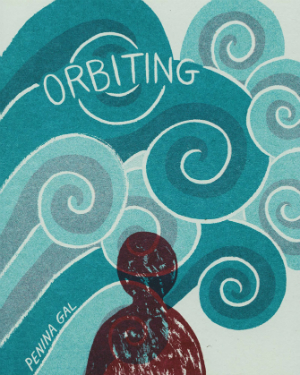 Pushing the boundaries of what might be categorized as a comic, Penina Gal’s Orbiting combines words and imagery to tug at universal heartstrings while simultaneously digging into the specifically personal. Gal wields abstracted yet evocative text and imagery with a deft touch, to guide the reader on a journey through insecurity, longing, and ultimately self-‐awareness. The form of the work eschews much of the grammar of the comics medium, yet fully embraces the potential of graphic storytelling. A story is being told here, but it is up to reader to decide whose.
Pushing the boundaries of what might be categorized as a comic, Penina Gal’s Orbiting combines words and imagery to tug at universal heartstrings while simultaneously digging into the specifically personal. Gal wields abstracted yet evocative text and imagery with a deft touch, to guide the reader on a journey through insecurity, longing, and ultimately self-‐awareness. The form of the work eschews much of the grammar of the comics medium, yet fully embraces the potential of graphic storytelling. A story is being told here, but it is up to reader to decide whose.
Formally Orbiting makes several conscious choices to further the open-ended nature of its narrative. Lusciously risographed, the entire minicomic is composed of two-page spreads that have their own internal invisible panel borders. While the reading order is obvious, without the mandate of panel borders or the gutter, our eye is given far more time to linger and flow through the action. The staccato rhythm of most comics would be antithetical to the floating dream like nature Gal is seeking to invoke.
The page construction calls to mind that of Edie Fake’s earlier risographed work, with Gal focusing on swirling organic curves as opposed to Fake’s intense geometric patterns. Further stymying specific interpretations of the narrative, most of the objects here are rendered in slight detail. The unnamed protagonist is a featureless silhouette. Single color sky, sea, and stem occupy huge potions of the page. Yet there are intense flourishes of intricate line work such as when Gal uses tea plant vines as a stand-in for the human nervous system. Of particular note here is the use of color. The thicker off-white paper leaves no space without a touch of color and makes the work feel less like a minicomic and closer to an art object. Gal leans heavily into the risograph process and the work is awash with unique blends of blues and magentas. With the repeated use of this set of shapes and colors linking soil to sea to sky to stars as narrator tries to sort out our place in all of them.
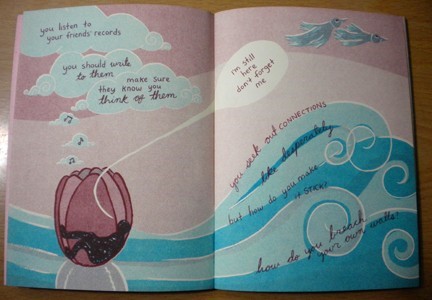
The means of storytelling in Orbiting then goes in a direction rarely tread by comics with the use of a single word, the word “you.” The second person, already a rarity in prose fiction is a technique almost entirely untouched upon in comics. The form lends it self so well to the third person in fiction and the first person in autobiography that even when characters do break the fourth wall and speak directly to the audience it takes on the form of a soliloquy rather than an outward address. Gal’s consistent use of the second person moves the reader to an undefined space. Who is the “you” the narrator is speaking to here? Even assuming the narrator is Gal, who is the recipient of this message: a friend, the reader, Gal themselves?
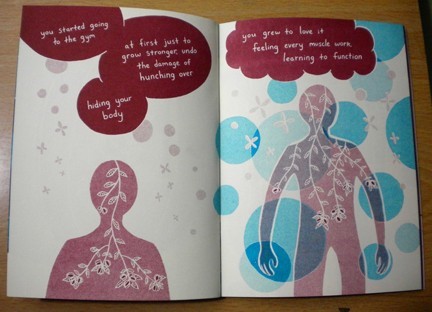
At times it would seem the “you” in question could be one choice in one portion of the narrative and another in a different section. As the message is so incrementally relayed by the narrator, the reader’s may likely read the “you” being addressed as themselves. The familiarity of being directly addressed then dropping the reader’s guard and allowing the words of the text to seep in and become a sort of guided meditation on their own insecurity. The line, “you seek out CONNECTIONS like desperately but how do you make it stick?” can be addressing the unknown recipient of this message, it could be Gal speaking to themselves, or speaking words we know to be true of ourselves directly to us. Similar ambiguity occurs in the later line, “your problems are nothing to the universe,” superimposed over a hazy speckled view of the galaxy. The narrator is addressing I as much as you, as much as they, as much as we.
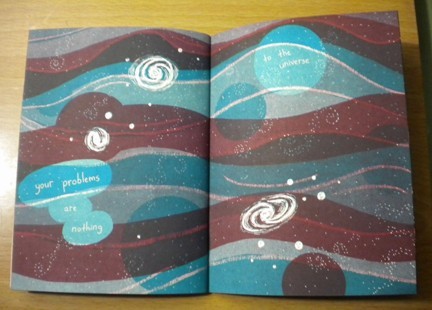
This collapsing of individual identity into the universal is the masterstroke of what Gal accomplishes with Orbiting. Only in the final pages is it revealed that the narrator is speaking to a trans person. But because we the reader have been given so much space to invest in what the narrator has been saying by making the subject ourselves, that when it is revealed we are not the ones being addressed the commonality appears.
Whatever our gender orientation we, just as the unknown recipient of this message, long for someone to say to us, “I tell you you’re brave and I love you.” Making an experience that may not be our own feel so close to our own that those linear barriers disappear replaced by the overlap of magentas, blues, and swirling chalk line whites into that which makes up the stuff of our insides as much as it makes up the fabric of the universe.
In the course of Gal’s artistic development, Orbiting is the work of an artist who gained access to the deeper currents of our shared humanity as well as the knowledge of how to pluck those chords with masterful precision. It represents a major step forward from their earlier work. Even if that step is away from what could strictly be defined as comics, it follows the path of comics-as-poetry to one of its most beautiful and empathic ends.
Penina Gal (W/A) Self-published, $12.00
Available to buy online from Radiator Comics.
Review by Robin Enrico





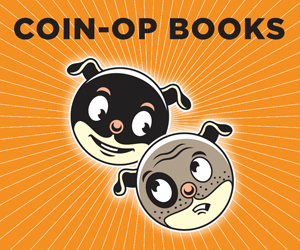

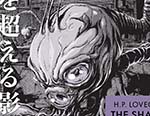

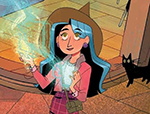
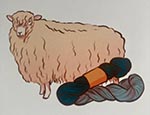
[…] Orbiting At Broken Frontier, Robin Enrico looks at some recent work from Penina Gal. […]